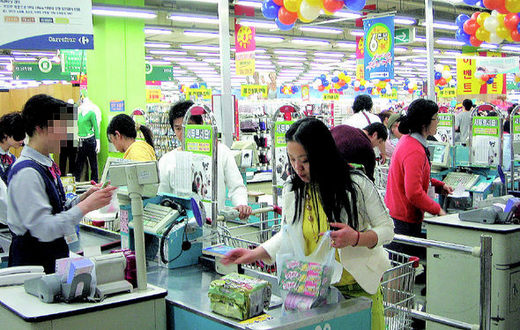 |
|
A scene inside a discount store.
|
Food manufacturers bear brunt of labor costs for stores, they say
Large-scale food product manufacturers are dispatching a considerable amount of their workforce to stores that sell the company’s products, where these workers promote the product to customers as well as do manual labor such as cleaning the stores and organizing storerooms. Some call the ’request’ for workers by the large stores more of a demand, given the stores’ hold on the market. Three-hundred fifteen Doosan Food BG employees engage in office work and production, but as many as 500 of its workers promote the company’s products at large supermarkets. Sampio Foods Co. also has about 300 staff members at its headquarters, but nearly 400 workers are disseminated to large discount stores. A survey performed by The Hankyoreh yesterday on 12 major food suppliers of large discount stores showed that the number of workers dispatched to retail stores was over 9,000. Most of these workers are sent to about 320 large discount outlets in the nation, according to the survey. An average of 750 workers were dispatched by the 12 companies surveyed.In consideration of the fact that 200 to 300 total staff members from manufacturing firms are sent to work at each major discount outlet, the total number of food manufacturing company workers sent to big discount shops nationwide is estimated to be between 60,000 to 100,000. An official of a supplier said, "Situations differ in each company, but more than 60 to 80 percent of those mobilized are sent by demand [from the large discount retailers]. If we don’t send our staff, we risk our products’ withdrawal from the store," likening the situation more to a threat than a request. As a consequence, the suppliers must assume increasing labor costs. To dispatch one person costs about 20 million won (21,000 USD) a year, so the 12 suppliers surveyed must cover up to 180 billion won annually for those workers. These workers are paid by the food suppliers, but actually function as workers of the discount stores. They conduct sales, cleaning, and other duties that should instead be performed by official store employees. As large discount stores have almost complete control over the distribution network of domestic markets, suppliers must listen to their demands as they cannot find markets for their products independently. No one is immune to the pressure: from small and medium companies to bigger firms with brand-name power, like Nong Shim, CJ, and Dongwon, all have dispatched staff to the major retailers. According to an official at a supply company, "Manufacturers are doing the sales work on behalf of the discount outlets, in addition to supplying the goods. The discount stores are becoming richer, while the suppliers’ situations are worsening." Discount stores claim that the dispatched workers are promoting their company’s products. If sales increase, both the suppliers and the stores make a profit, they say. But even if the sale goes up, the suppliers complain, they cannot make a profit due to the increase in personnel expenses for having to dispatch their workers in the first place. Such additional cost is rolled into the price of goods, with consumers bearing it in the end. An official of a supplier said, "Large discount stores [say they] are reducing their labor costs by using those workers. But the reality is that production costs rise 5 to 8 percent due to these additional expenditures on personnel."





